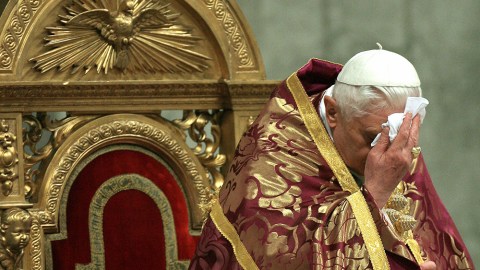10 Powerful Quotes on Atheism

The disparity between how humans feel about themselves and how we treat the world has grown thanks to social media. Awareness of the impact of climate change and the stunning destruction of fundamentalist religious ideologies has intensified, yet a belief in our innate specialness persists.
While from the perspectives of survival and perpetuation we’ve done well over the last few centuries, the dangerous forces we’ve unleashed on our environment and ourselves are unsustainable. Oddly this has increased the notion that we’re chosen animals. The following quotations are not outright denials of our sacred place in the universe, though they sure bring that idea into question.
There’s no better place to start than biology. While Richard Dawkins is now one of the world’s most outspoken atheists, his 1976 book, The Selfish Gene, not only coined the term ‘meme,’ it also taught us to consider how human value is measured. Contemplating genes, he writes:
They are the replicators and we are their survival machines. When we have served our purpose we are cast aside. But genes are denizens of geological time: genes are forever.
Alan Watts had an especially sharp eye toward religious principles. The former Episcopalian priest became a preeminent translator of Buddhist and Taoist texts when his disenchantment with Christianity began. Underlying his lucid works was the quest for liberation—a process that we’re better off attempting without religion, as he explains in his memoir, Cloud-Hidden, Whereabouts Unknown:
You are somehow freed to do things lovingly and well when you realize that you are not doing anything out of duty or obligation to an overlord. When you no longer make the distinction between the universe and how you are acting upon it, you are really on your own and so acquire a sense of responsibility.
Neuroscientist V.S. Ramachandran questions the idea that humans are special creatures. This, like Watts above, increases our potential for responsibility and self-understanding, however. Being part of the process of life is empowering; suffering occurs when you believe yourself separate from it, as he explains in Phantoms in the Brain:
Far from being humiliating, this idea is ennobling, I think. Science—cosmology, evolution and especially the brain sciences—is telling us that we have no privileged position in the universe and that our sense of having a private nonmaterial soul ‘watching the world’ is really an illusion … Once you realize that far from being a spectator, you are in fact part of the eternal ebb and flow of events in the cosmos, this realization is very liberating.
While The Evolution of God was not a book specifically about atheism—Robert Wright traces the history of Western religions to show how they’ve moved toward a higher moral plane—it does question the efficacy of overtly inclusive religious practices:
Any religion whose prerequisites for individual salvation don’t conduce to the salvation of the whole world is a religion whose time has passed.
And also…
The inhabitants of the earth are of two sorts:Those with brains, but no religion,And those with religion, but no brains.
Abu’l-`Ala’ al-Ma`arri
In his forthcoming book, From Bacteria to Bach and Back: The Evolution of Minds, philosopher Daniel Dennett tackles the theory that metacognition implies an intentional designer:
Comprehension, far from being a Godlike talent from which all design must flow, is an emergent effect of systems of uncomprehending competence: natural selection on the one hand, and mindless computation on the other.
Historian Yuval Noah Harari makes his skepticism clear in Sapiens: A Brief History of Humankind. Rather than denying God’s existence, he uses logic to question the underlying foundation of the possibility of a creator:
Monotheism explains order, but is mystified by evil. Dualism explains evil, but is puzzled by order. There is one logical way of solving the riddle: to argue that there is a single omnipotent God who created the entire universe—and He’s evil. But nobody in history has had the stomach for such a belief.
Former monk Stephen Batchelor leaves behind the craving for validation in this world or any that follow in Confessions of a Buddhist Atheist. He focuses instead on the development of character and how he engages with existence in this explanation of his Buddhist practice:
One neither seeks nor expects to find some greater truth lurking behind the veil of appearances. What appears and how you respond to it: that alone is what matters.
Speaking of Buddhism, Sam Harris’s Waking Up: A Guide to Spirituality Without Religion combines his neuroscience degree with his training in mindfulness meditation. Regardless of the religion or spiritual discipline you practice, they all begin with neuronal firings:
Thinking is the basis of every social relationship and cultural institution we have. It is also the foundation of science. But our habitual identification with thought—that is, our failure to recognize thoughts as thoughts, as appearances in consciousness—is a primary source of human suffering. It also gives rise to the illusion that a separate self is living inside one’s head.
Finally, it would be sinful to leave out Christopher Hitchens who, in God is Not Great, sums up so much in so few words:
Faith discredits itself by proving to be insufficient to satisfy the faithful.
—
Derek’s next book, Whole Motion: Training Your Brain and Body For Optimal Health, will be published on 7/4/17 by Carrel/Skyhorse Publishing. He is based in Los Angeles. Stay in touch on Facebook and Twitter.





